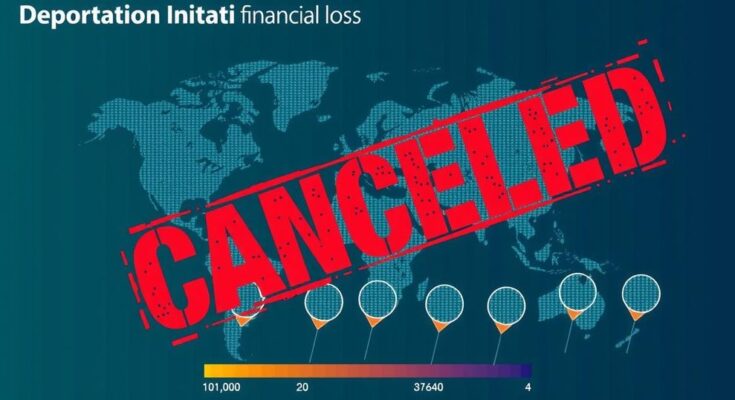The UK government expended £715 million on the now-scrapped Rwanda deportation scheme, primarily on payments to Rwanda, logistics, and IT systems. Home Secretary Yvette Cooper reported that the initiative resulted in only four voluntary deportations and did not effectively deter Channel crossings, prompting a reevaluation of immigration policies by the new Labour government.
Recent revelations disclose that approximately £715 million was expended on the Rwanda deportation scheme before its halt, a significant portion of which was allocated to various operational costs. Among the detailed expenditures, £290 million was paid directly to the Rwandan government, with an additional £50 million dedicated to logistics including flights and security arrangements. The establishment of new IT systems, legal expenditures, and staffing accounted for around £280 million of the total costs.
Home Secretary Yvette Cooper informed the House of Commons about these expenditures, stating, “In the two years the partnership was in place, just four volunteers were sent to Rwanda at a cost of £700 million.” She further noted, “This so-called deterrent did not result in a single deportation or stop a single boat crossing the Channel.” These figures illustrate the lack of efficacy of the scheme, which was intended to deter illegal migration.
The initiative, launched under the previous Conservative administration, aimed to deport individuals arriving by small boats across the English Channel to Rwanda, purportedly as a means to discourage such crossings. However, the Labour government scrapped the scheme earlier this year, projecting immediate savings of £750 million, which are now intended for reinvestment in enhanced border security efforts.
The Rwanda plan was met with skepticism regarding its effectiveness, as critics highlighted insufficient evidence to indicate that it would deter unauthorized crossings. Conservative leader Kemi Badenoch remarked that her party is contemplating similar deterrent strategies as part of a revised approach to migration policy.
This summary underscores a significant financial commitment that has yielded virtually no successful deportations, raising questions about the overall efficacy of such governmental initiatives regulating migration.
The Rwanda deportation scheme was designed as an innovative yet contentious approach to managing immigration through the deportation of migrants who arrived in the United Kingdom via the English Channel. Launched by the Conservative government, the initiative aimed to deter unauthorized crossings by relocating migrants to Rwanda. The partnership involved substantial financial investments in logistics, legal frameworks, and operational support. The recent governmental change brought about a reevaluation of this plan, leading to its cessation amid concerns about its effectiveness and ethical implications. Notably, the findings following the scheme’s cessation have raised alarms regarding the considerable expenditures versus achieved outcomes.
In conclusion, the breakdown of the £715 million spent on the Rwanda deportation scheme reflects a significant financial undertaking that culminated in minimal results regarding the actual deportation of migrants. The government’s acknowledgment of the ineffective deterrent nature of the scheme and the subsequent decision to terminate it points towards a need for reassessment of immigration strategies. As political leaders consider innovative approaches to migration, it is crucial to ensure that such initiatives are grounded in evidence-based practices that genuinely address the complexities of immigration issues.
Original Source: www.expressandstar.com




